Welcome to our Applicant Hub for Music!
On this page you'll find a taste of our department in four sections.
In 'Meet our students' and 'Meet our staff', get to know some of the friendly faces you'll encounter during your studies, and see their recommendations for summer reading and listening.
Under 'Videos', sample some of the composition and performance activities taking place at Royal Holloway.
Under 'Courses and activities', try out some of the subjects you'll be studying with us.
Finally, under 'Foundation Year students' we have some additional activities and information you might be interested in if you're joining us via one of our foundation year options, as well as all of the above!
We can't wait to meet you in September! In the meantime, if you'd like to get in touch, you can email our admissions department at study@rhul.ac.uk, or the Music Admissions Tutor, Dan Elphick, at daniel.elphick@rhul.ac.uk. You can also interact with us via:
Chat with our students:
Unibuddy – ask our students https://www.royalholloway.ac.uk/chat/
Social:
Instagram: https://www.instagram.com/musicatroyalholloway/
Twitter: https://www.twitter.com/RHULMusic
Meet our students
Natalie

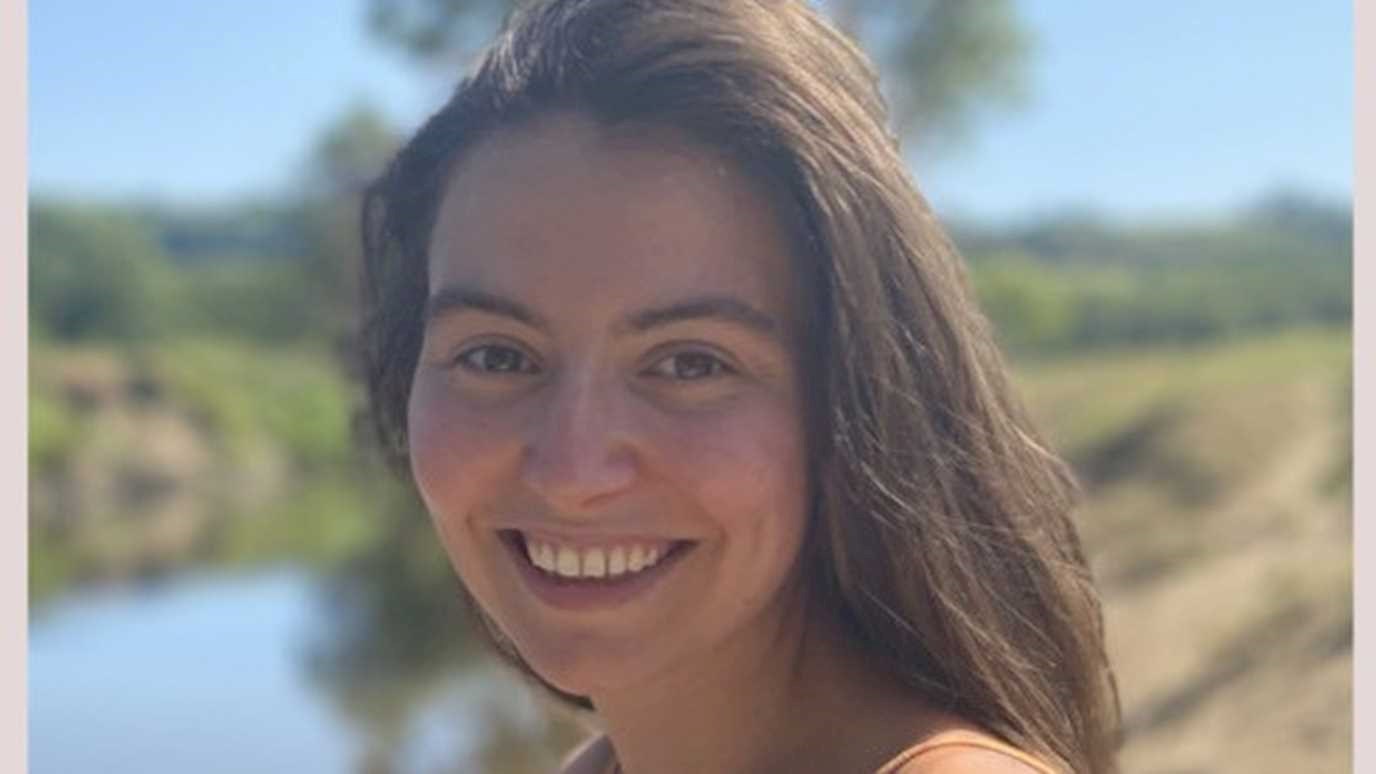

Something to listen to over the summer...
Duke Ellington’s Nutcracker Suite! Studying classical music which has been “jazzed” has been a personal favourite topic of mine this year. It has been something I’ve never studied in detail before and I hear something new in Duke Ellington’s Nutcracker Suite every time I hear it! It is definitely and intriguing listen which will excite you and give you an idea of what the modules cover.
Something to read over the summer...
I loved reading “Gareth Malone’s Guide to Classical Music” the summer I joined Royal Holloway. It got me thinking about new ways of studying classical music and analysing different viewpoints. A lot of his TV programmes are also really interesting if reading isn’t your thing... I would also recommend watching Gareth Malone’s “The Choir”, which was filmed at Royal Holloway!
One thing to bring with you to university is...
A doorstop! When your bedroom door is propped open, it’s definitely more inviting and allows people to pop by and say hello!
The best part of my first year was...
Getting involved in so many clubs and societies. It is definitely the best way to make friends and find people who share similar interests to you. Get involved and you won’t regret it!
Alex

Something to listen to over the summer...
Stravinsky's "The Rite of Spring". Covered in the short history module and is mentioned and linked in a couple of other first year modules.
One thing to bring with you to university is...
Headphones! Listen to music while you're studying, walking to lectures, walking home etc. – you'll get lots of use out of them!
The best part of my first year was...
Doing digital composition in term 2 of the composition portfolio module.
Janhavi

Something(s) to listen to over the summer...
'Chameleon' by Herbie Hancock
'Mississippi Goddam' by Nina Simone
Something(s) to read over the summer...
Mykaell Riley, 'Bass culture: an alternative sound track to Britishness'
Michaela Baranello, ‘Welcoming a Black Female Composer into the Canon. Finally.’ The New York Times, 9 February 2018.
One thing to bring with you to university is...
A folding music stand (for possible Musical Theatre productions and gigs, but could also be used to practice in your room if your instrument is quiet enough!)
The best parts of my first year were...
Using 'Stan' by Eminem as part of my formative assignment for Contemporary Debates (I never thought Eminem and academics could inhabit the same space).
Being part of the Gamelan Ensemble.
Watching the Royal Holloway Symphony Orchestra play Dvorak’s 'New World' Symphony.
Dan

Something(s) to listen to over the summer...
I’d have to say John Adams ‘Short Ride in a Fast Machine.’ It is already a fairly well-known piece (on the BBC Ten Pieces I believe) and it is one of my favourite modern orchestral pieces. Considering it’s only 4 minutes long, it packs quite a punch! I chose this in particular as it showcases several aspects of contemporary composition practice (e.g. approaches to harmony and rhythm) and with influences from jazz, it highlights minimalism’s position between the classical and popular music spheres.
Something(s) to read over the summer...
Pick any chapter (perhaps one based on what you consider your specialism; performance, composition, music history) from the book ‘An Introduction to Music Studies’ by J.P.E. Harper-Scott. The book was written by staff at RHUL as an introduction to university-level music studies, so it should get you thinking of how the areas you know already are developed at university.
One thing to bring with you to university is...
(Without meaning to sound corny and because I couldn’t think of an actual object) an open mind. University music studies introduce you to many new types of music and many new concepts of what music actually is. You’ll be investigating different traditions from around the world as well as different historical practices, all of which can inform your own approaches to making music. (Actually, an obvious object not to forget would be your instrument if you play one!)
The best part of my first year was...
The Andean Band end-of-year concert in the Boilerhouse auditorium. I still think it’s the most fun I’ve had on stage! It was really interesting playing a genre of music that was initially unfamiliar to me, but learning about the different instruments and tunes associated with them was fun. And for one song we all danced around in a massive circle, singing in Quecha!
Peter
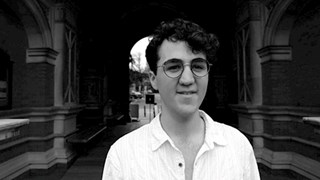
Something to listen to over the summer...
Shostakovich's String Quartet No 7, Kapustin's Cello Concerto No 2, Splendour & Misery by Clipping (a concept album which is really compositionally interesting).
Something to read over the summer...
Allan Moore's ‘Authenticity as Authentication’ article about how we judge authenticity in music. Read it here.
One thing to bring with you to university is...
Manuscript paper!
The best part of my first year was...
Performing in the Andean band/Balkan ensemble concert at the end of the year.
Enzo
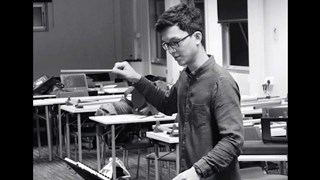
Something to listen to over the summer...
Something outside your typical playlist. Also, very useful, get Spotify Premium Family! It's easy on your student loan and will come in super handy for listening...
Something to read over the summer...
Composer biographies, music histories! (I wish I did them earlier.)
One thing to bring with you to university is...
A piece (or many pieces!) of home that remind you that you are loved and valued by family and friends, and privileged to go to one of the best universities in the country to do a degree in music. In a new environment, you might feel isolated and lonely etc... You are not alone! Also, these items will hopefully encourage you to push yourself and do your best, even when the going gets tough, as they did for me. These could be photographs, cards, uplifting quotes to decorate your room with!
The best part of my first year was...
The freedom to try many new things for the first time. One thing I'll never forget is performing a piano trio piece for the first time during a festival in summer term, celebrating female composers in music.
Antonia


Something to listen to over the summer…
"The night of the purple moon" by Sun Ra, and Steve Reich's Early Works.
Something to read over the summer…
Oval: A Novel by Elvia Wilk.
One thing to bring with you to university is…
Pyjamas that you don't mind strangers seeing you in... yes, 3am fire alarms do happen!
The best part of my first year was…
Enjoying a drink and bonding with friends on a sunny day at Crosslands.
Meet our staff
Julie Brown
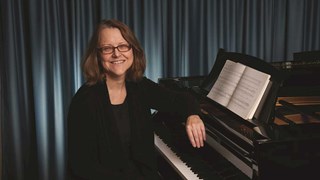
One of my favourite modules to teach is...
Contemporary Debates in Music
I like opening up topics that the students may not previously have reflected upon, and encouraging them to think around those topics. Because of the enormous issues around 'fake news' and 'media/information bubbles' that social media has significantly exacerbated, I'm proud that we have such a course in our first year curriculum, one that places an immediate emphasis on debate and critical reflection.
To listen over summer…
I'd encourage exploratory listening. Listen to music that you wouldn't normally!
If I were to recommend one concept to think about prior to starting Year 1, it would be...
The concept of Rhetoric.
Stephen Downes


One of my favourite modules is:
Analysing Popular Music
An excuse for me to play all my favourite songs and look in detail at the way they are put together formally, harmonically, and melodically
To listen to over the summer:
Earth, Wind and Fire, 'Fantasy'; this band were virtuosos in the 1970s funk/disco style and Philip Bailey had one of the great falsetto voices - don't wait until 'September' (another great EWF song!)
If I were to recommend one thing to think about ...
Consider one of your favourite pieces... can you identify, in detail, why you find it beautiful?
Julian Johnson

One of my favourite modules to teach is...
Claude Debussy and French Musical Aesthetics
I get to talk about some of the most amazing music but also to think about it in relation to the poetry and paintings of Debussy's contemporaries working in Paris around 1900.
To enjoy over summer…
To watch: Joe Wright's The Soloist (2009) – it's on Netlix. It's about a cellist, performance, mental health, and Beethoven's music. It's particularly thought-provoking at the moment.
To listen: if you don't know them, try the Etudes for piano by the ever-inventive Gyorgy Ligeti. If you don't like the first one you come across, try the next: they're wonderfully different!
If I were to recommend one concept to think about prior to starting Year 1, it would be...
How and why do we value music? All our debates, all our histories, all our different approaches to music, assume that what we're studying somehow matters. Why? What is it that music does which makes us value it so much?
Rebecca Miller

One of my favourite modules to teach is...
Orchestra
I love challenging the musicians to achieve more than they thought possible. I love leading the interaction between musicians, opening their eyes to new repertoire, and developing their leadership and communication skills through orchestral playing and leading opportunities.
To enjoy over summer…
Women composers! Louise Farrenc, Emilie Mayer, Dorothy Howell, Amy Beach, Grace Williams, Ethel Smyth - there's so much wonderful music out there by women composers that hasn't made it into the mainstream classical repertoire. Louise Farrenc's symphonies are extraordinary - lots of ideas and invention. Emilie Mayer's Symphony no. 5 is a particular favourite of mine, and I also love Ethel Smyth's Serenade. Check some of them out, and read about their lives as well!
If I were to recommend one concept to think about prior to starting Year 1, it would be...
Interpretation - what is our job as musicians? Is it our job to interpret the music, or just to realise it off the page? Is it our job to get as close as possible to the composer's intentions, or to adapt the markings in the score to what techniques/equipment is available to us today? Is the score the music, or is it only music when it's performed?
Tom Parkinson

One of my favourite modules to teach is...
Composing with Technology
This module combines all the technical skills accumulated throughout the course, allowing students to showcase their creativity across a range of briefs.
To listen over summer…
'Excuse the Mess' composer interview podcast.
If I were to recommend one concept to think about prior to starting Year 1, it would be...
Everything we can hear happens within what is called the 'audible frequency spectrum'. When listening to music and other sounds, try to identify what is happening at different ranges: sub-bass, Bass, Low mid, high mid, high and ultra-high.
Tina K. Ramnarine



One of my favourite modules to teach is...
Sibelius and the Music of Northern Europe
Sibelius wrote some works that had strong social effects. For example, Finlandia was crucial in expressing independence and the violin concerto contributed to thinking about gender equality in solo performance.
To enjoy over summer:
Listen to Ida Haendel performing the Sibelius violin concerto. You might enjoy my new book to go along with it, Jean Sibelius's Violin Concerto.
If I were to recommend one concept to think about prior to starting Year 1, it would be...
'Decolonising music' as a way of thinking about equality issues in music
Tim Summers


One of my favourite modules to teach is...
Music and Video Games
I love exploring games and music, and the relationship between the two. Yes, this includes music in video games, but also ideas of music and play and interactivity more generally. I always say that this module is both about what music can tell us about games, but also what games can tell us about music. Whether it’s nostalgia, storytelling or what classical music means today, games are a great venue to investigate all sorts of ideas about music. It’s great to discuss new ideas from my research with students, so we explore and learn together.
To listen over summer…
I’m also working on music for theme parks. I’d recommend Jerry Goldsmith’s music for the ride Soarin’ Over California. It’s a lesson in orchestration as the same theme comes back repeatedly for 5 minutes orchestrated in a huge variety of ways.
Listen to some of James Hannigan’s game music, and think about how he draws upon, and blends, different styles.
I also teach some pop music, so check out ‘Relight My Fire’ and listen to how clear it is, even though there are so many instruments playing.
If I were to recommend one concept to think about prior to starting Year 1, it would be...
Music and storytelling. Is music telling you a story, like a narrator? Or is it more like a story happening in front of you, like a play? How specific can music be about what’s happening in the story? Are there particular types of stories that are harder or easier for music to tell?
Shzr Ee Tan

One of my favourite modules to teach is...
Introduction to Jazz
We talk (and sometimes play!) through musical issues that are deeply connected with current and evolving debates on racism, gender, protest and politics. It's a course that also teaches you what you can do to take action as a musician, thinker and listener. Plus, optional dancing and improv involved!
To enjoy over summer:
You've heard of K-pop, but how about J-pop? Polysics: https://www.youtube.com/watch?v=N0q0W9uJzIA
If I were to recommend one concept to think about prior to starting Year 1, it would be...
Decolonising Music
Nina Whiteman

One of my favourite modules to teach is...
Composition Portfolio
Students taking this module learn about writing for voice, which is one of my main interests as a composer and vocalist. We listen to music by a range of artists in lectures and independent study time, thinking about how the voice is used and how text is set in rap, punk, experimental, classical and other genres. Students collaborate on a playlist to share ideas and interests.
To enjoy over summer:
Nina Simone's live album 'In Concert' (1964). I've been returning to this in recent times as it features really powerful protest music performed by one of the twentieth century's most distinctive vocalists!
If I were to recommend one concept to think about prior to starting Year 1, it would be...
Texture. What exactly do we mean by texture in music composition? How can we manipulate it to make really exciting and inventive sound combinations? This musical parameter has endless creative possibilities. Try making a list of textures you would like to explore in your own music!
Staff recommendations – Spotify playlist
Check out our Staff Recommendations playlist on Spotify!
Videos
Music for bubble wrap?
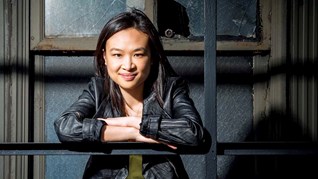
Meet one of our Composers, Tonia Ko.
Tonia says: "Part of my creative practice uses bubble wrap as a musical instrument and art canvas. To that end I created a quintet in 2015 with live electronics!"
Watch the video here:
A message from the Musical Theatre Society
Meet Dan, President of Royal Holloway's Musical Theatre Society:
A message from Undergraduated Big Band
Meet DK, President of Royal Holloway's Undergraduated Big Band:
The Choir of Royal Holloway
In this video, the renowned Choir of Royal Holloway sings The Spheres by Norwegian composer Ola Gjeilo (1978–):
Courses and activities
Analysing Music
Analysing music is all about using techniques and tools to gain insight into a piece of music or a musical practice.
Composition
When you start composing at university, as well as refining your technical craft and skills, we challenge you to find new ways to express yourself through music.
Debates in Music
In courses like ‘Contemporary Debates in Music’, we develop our understanding of music by discussing some provocative statements or ideas.
History of Music
In historical courses, we approach music from the Medieval era to the present day through its social and political contexts, its compositional styles and notations, its aesthetic and philosophical ideas, and through editing early sources.
Music in Cultures from Around the World
Studying music from around the world not only allows to find out about music and other cultures, but it also makes us rethink our own assumptions about music.
Performance
Music can’t exist outside time. When we hear music, even if it is a recording playing, it is always something happening at a particular time and place. Music always sounds in context. When we perform music, we are enacting a musical event.
Foundation year students
If you're joining us via a Foundation Year
If you’re going to be joining us for the Integrated Foundation Year for Music or Music and Sound Design, we look forward to meeting you as part of the Foundation cohorts! Your Foundation year will be a combination of general studies and music-specific courses.
To help you prepare for the music courses, there are some fantastic introductions to music studies which you might find helpful. In particular, you might want to ask your local or school library for:
An Introduction to Music Studies, edited by Jim Samson and J.P.E. Harper-Scott. This book was produced by our Department, and provides a neat overview to all aspects of studying music.
Very Short Introductions to Music, including:
- Music by Nicholas Cook
- Early Music by Thomas Forrest Kelly
- Ethnomusicology by Timothy Rice
- Film Music by Kathryn Kalinak
You might like to brush up on your music reading skills, too. Here are some links from the technology company Soundbrenner, who are one of our partner on our Cyborg Soloists research project.
https://www.soundbrenner.com/blog/best-online-resource-for-music-theory/
You can also take a look here for even more foundation year content and activities!




















